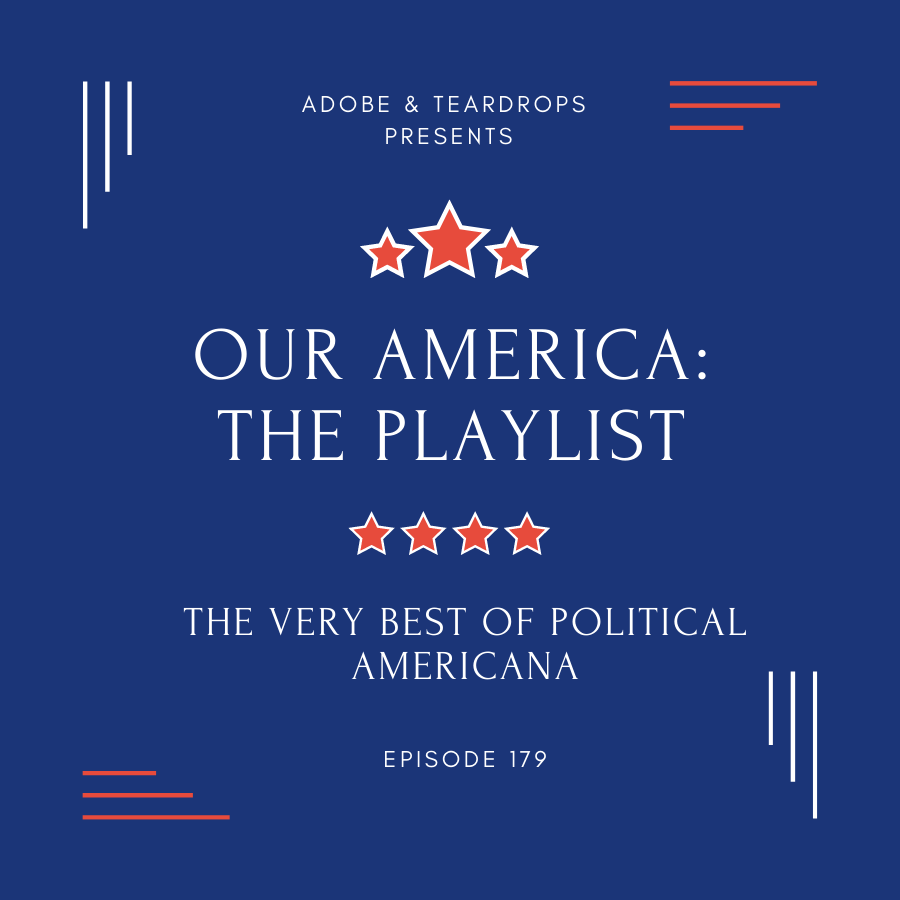Hi, there, Teardrops, and happy fourth! I’m going camping this weekend but the weather looks like it’s gonna be garbage! I sure can’t wait! Before we go any further, remember that you can always find a transcript for this episode at adobeandteardrops[dot]com.
Speaking of garbage, let’s talk about America. (Yeah, I went there.) While there are plenty of things to celebrate about this country — for example, the legal protections to even create the music we’re going to listen to on this episode — there’s so much to mourn. More importantly, there’s a lot of history that needs to be, well…not uncovered, so much, because all of the events discussed in these songs are well-documented, but disseminated into the mainstream, shall we say.

So this episode seeks to feature artists across genders, race, culture, and genres who are grappling with what it means to be American. If you haven’t yet, I urge you to check out Episode 170, which features anti-racist White artists using country music effectively.
We’ll begin with No-No Boy’s astonishing album 1975, a deeply personal exploration of his family’s histories as Japanese-Americans and Vietnamese Americans. The name No-No Boy comes from the concentration camps that America created in World War II to systematically strip the land and wealth away from Japanese-American families, primarily on the West Coast. In the concentration camps, Japanese-Americans were required to sign an oath of loyalty, particularly for young men who wanted to join the war effort. Those who answered “no” to two different questions on the loyalty test — basically, if they swore to uphold the war effort — were segregated and further isolated in the Tule Lake internment camp. People had different reasons for signing “no,” but many did so to resist the draft. You can read more about it here. (PS, I linked to Devon Leger’s review of the album in Folk Alley in the shownotes.)
“Close Your Eyes and Dream of Flowers” is absolutely devastating, reminding us that we haven’t left this history very far behind at all. Patreon subscribers will also hear “Where the Sand Creek Meets the Arkansas River,” which I thought was an incredible illustration of how white supremacist settler colonialism has so many layers. A final note: you may hear the word “nisei,” which means “second-generation” and describes those who had parents emigrate from Japan and grew up in the US.
- No-No Boy — “Close Your Eyes and Dream of Flowers” (1975) (4:03)
- Nana Grizol — “Plantation Country” (South Somewhere Else) (7:26)
I know I’ve played this Nana Grizol song like a zillion times since South Somewhere Else came out, but “Plantation Country” is such a powerful reckoning with historical silences that I just had to play it here.
I think this next one by Leyla McCalla is pretty self-explanatory, but if you never got around to Capitalist Blues, I hope that “Money is King” will persuade you to check it out. I love McCalla’s use of vintage jazz to bring alive echoes of the Industrial Revolution and the way it continues to grind us down.
- Leyla McCalla — “Money is King” (Capitalist Blues) (12:24)
- Hurray For the Riff Raff — “Rican Beach” (The Navigator) (15:17)
I don’t think I mentioned it on the podcast yet, but I openly wept during In the Heights. It’s a complicated feeling to see the neighborhood I love be depicted so gloriously onscreen, even as I’m a part of the problem. So that of course made me think of “Rican Beach,” Hurray For the Riff Raff’s glorious celebration of the Bronx, and fear for its downfall, from The Navigator, probably one of my all-time favorite albums.
Before we go into the final set for today, huge thanks to Alma Country for making the podcast opening and Two Cow Garage for allowing me to use “Stars & Gutters.” I’m taking a break from SubmitHub but you *can* send me music that way, and you’ll get a notification when I turn it back on. Speaking of capitalism, you can give me some of your capital by subscribing to the Patreon, contributing to the Ko-Fi, or snagging some merch. You can also get a copy of Rainbow Rodeo, the world’s first queer country music zine, at the merch page! Hit that subscribe button on your podcast app because next week, Grace Pettis and I are going to talk about feminist country music in an episode I like to call “Papa, Don’t Lay That Shit on Me!”
Our last set is…shall we say, aspirational. I know I like to dump on the Highwomen, but since the album came out they’ve shown that they can learn from their very public mistakes and are literally putting their money where their mouth is. Also, I love “Crowded Table” as a song and its message, so I’m closing this set out with it as a sort of benediction, an illustration of what we’re working for. But you can see where I’m conflicted, because Two Cow Garage’s “Brand New Flag,” the title track off their last album, is all about tearing everything down in order to build the crowded table.
If nothing else, in music we trust, in music we believe. Be safe this weekend.
- Highwomen — “Crowded Table” (The Highwomen) (20:46)
- Two Cow Garage — “Brand New Flag” (Brand New Flag) (24:35)
Next week’s topic: Papa, Don’t Lay That Shit On Me with Grace Pettis
Podcast intro by Alma Contra, music from Two Cow Garage’s “Stars & Gutters”
Send me music via SubmitHub!
Get A&T gear and Rainbow Rodeo at the merch page!
Send me money via Ko-fi or Patreon. Find Rachel and her comic via https://linktr.ee/rachel.cholst
